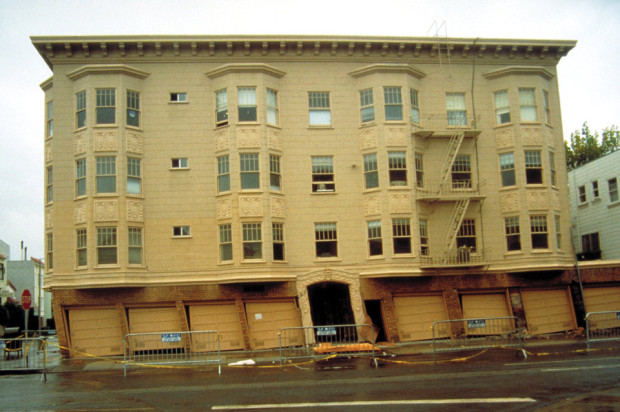
At least 2,800 buildings in San Francisco that are believed to be the most vulnerable in an earthquake must make seismic retrofits under an ordinance given unanimous initial approval today by the city’s Board of Supervisors.
The ordinance, sponsored by Mayor Ed Lee and several supervisors, will require retrofits of soft-story buildings, ones that are seismically unstable with garages or other large openings on the first floor, were built before 1978, are at least three stories tall and have five or more units.
According to a study commissioned by the city, about 58,000 people and nearly 2,000 businesses reside in those buildings, which are located primarily in the city’s Mission, Marina and Richmond districts and Western Addition and North Beach neighborhoods.
Supervisor London Breed said the ordinance will help residents by “making it far less likely that they are injured or displaced” in the event of a large earthquake.
Breed recalled being a high school student during the 1989 Loma Prieta earthquake and seeing many soft-story buildings “basically leaning over to the side” after the quake.
“This legislation is long, long overdue,” said Supervisor Scott Wiener.
Wiener said the retrofits “won’t be cheap” and will be “a shared sacrifice that we as a city need to make.”
Elsewhere
San Francisco aiming to ease rent-hike jolts from seismic upgrades [Ex]
But tenants rights groups say that the sacrifice will primarily be made by renters since city rental laws allow landlords to pass 100 percent of seismic retrofit costs onto tenants at an increase of up to 10 percent in annual rent.
“We simply don’t think it’s fair,” said Sara Shortt, executive director of the Housing Rights Committee of San Francisco. “Why not split the costs between the owners and tenants? Owners have a lot to gain … it’s an investment essentially.”
Board president David Chiu said he is working with the groups on trailing legislation that will simplify the process for tenants to declare a financial hardship and avoid paying the rent increase, which is estimated by the city controller’s office to be between $38 and $79 per month.
Shortt said her organization was happy with that compromise.
“We think we can get to an agreement that owners and tenants can be happy with,” she said.
The ordinance will come in front of the supervisors again for final approval at the board’s next meeting.
Dan McMenamin, Bay City News









